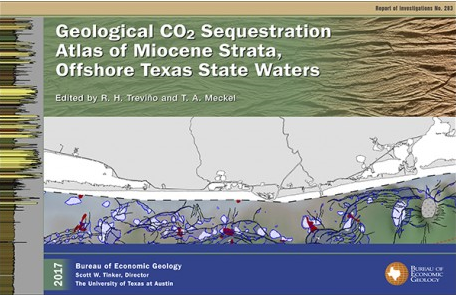Activities
TXLA CMC Newsletters
2025: | Q1 - March | Q2 - June | Q3 - November
2024: | Q1 - March | Q2 - June | Q3 - October | Q4 - December
Activities
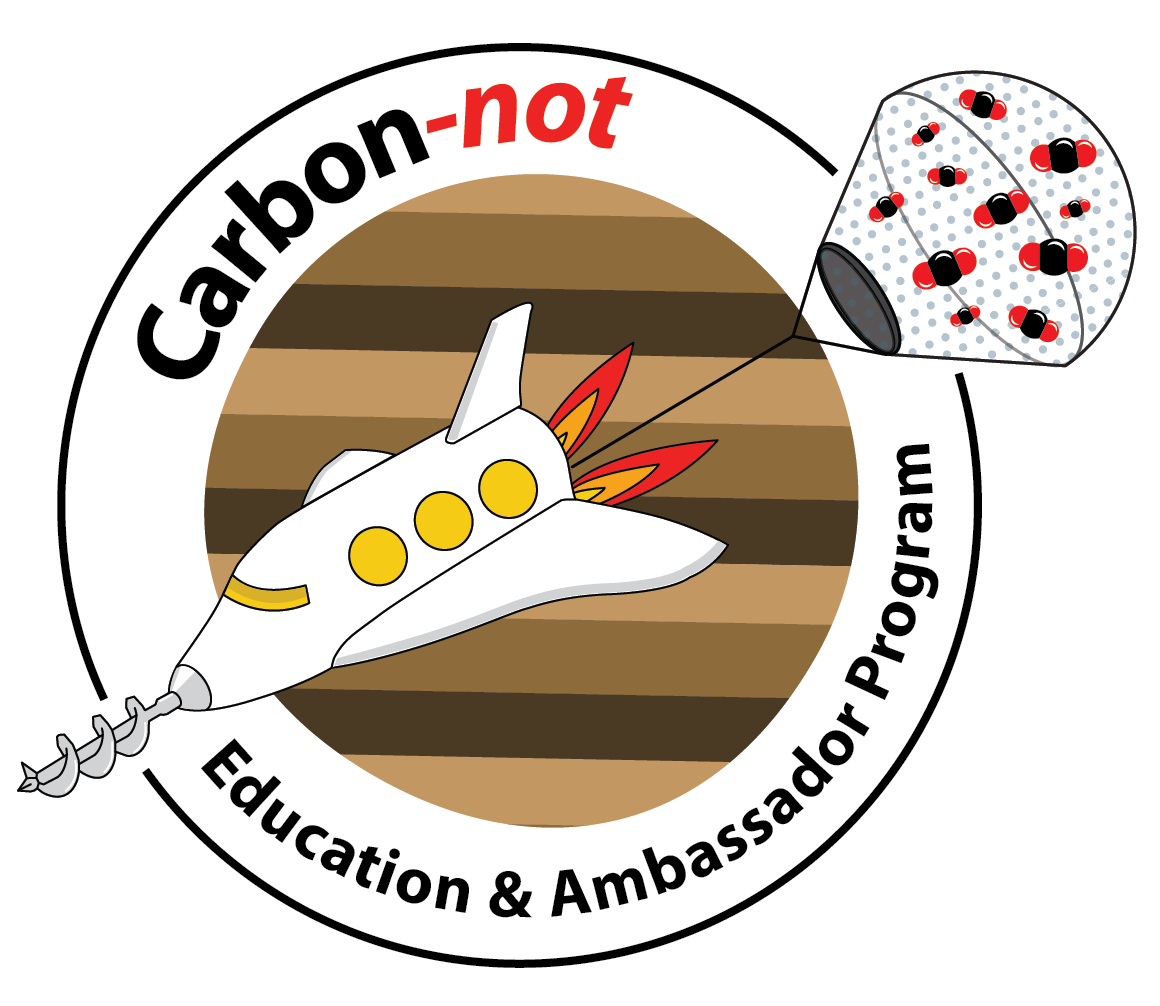
November 14th, 2025: We are delighted that our Carbon-not Education & Ambassador Program continues to thrive and create great results. Two high-school teachers, known as Carbon-not Ambassadors trained over the summer of 2025 at the GCCC and teamed up with GCCC Researchers to lead a 1.5-hr-long workshop for ~20 teachers. This workshop ties environmental science and chemistry fundamentals to a groundwater monitoring lab exercise. This lab exercise allows teachers and students to explore and understand groundwater aquifer reactions when carbon dioxide (CO2) is introduced, via analysis of water quality parameters like pH, total dissolved solids, alkalinity, and hardness. As part of this new assignment designed for STEM teacher’s support, students learn about the reactivity of carbonate and silicate rocks when CO2 is introduced and can recognize the signs of the gas’ presence in a closed system. Check out all of our materials that are accessible in an online format at put-it-back.org.
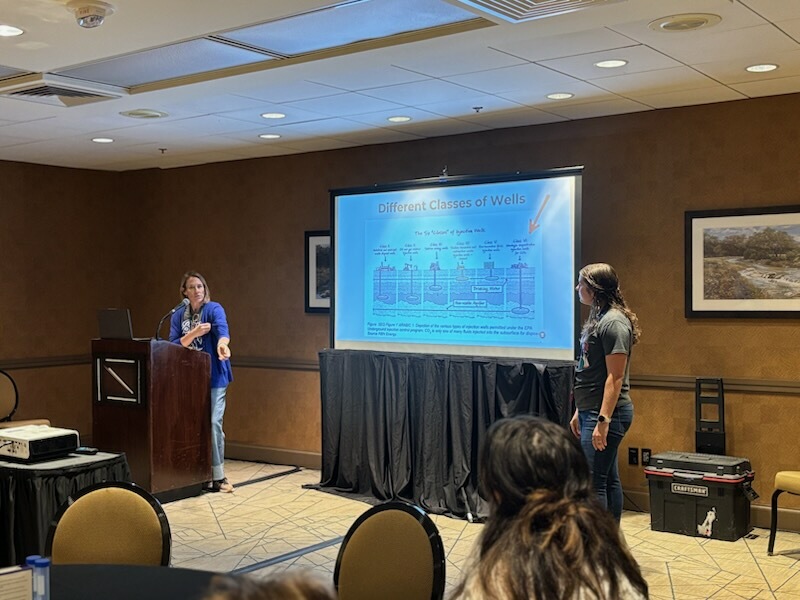
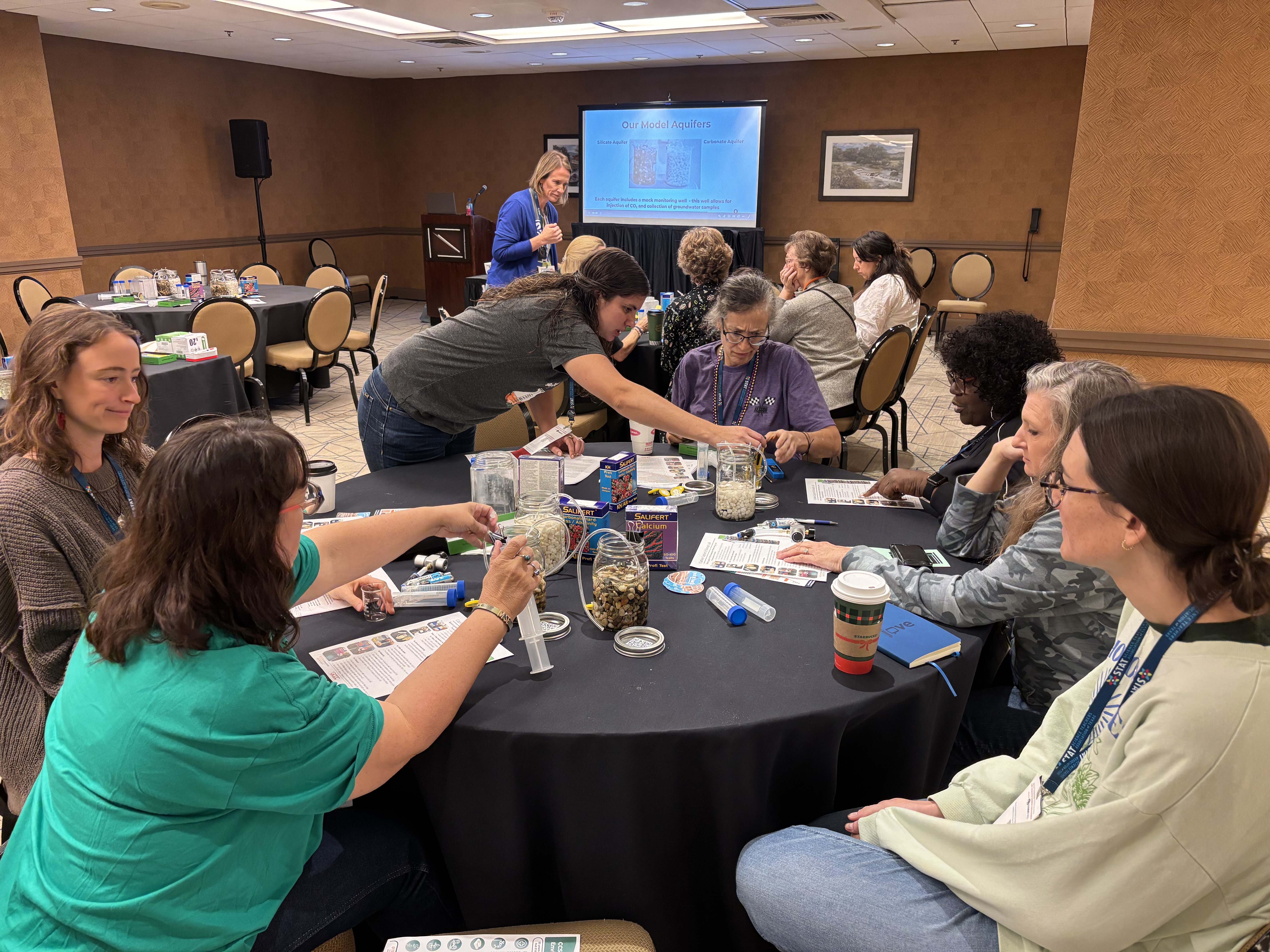

November 13–15, 2025: GCCC Representatives attended the 2025 Conference for the Advancement of Science Teachers (CAST) in Dallas, Texas. As a part of a Texas Louisiana Carbon Management Community (TXLA CMC) initiative, Angela Luciano and Susan Hovorka presented educational and outreach materials to K-12 educators alongside the Bureau of Economic Geology’s Public Information Geologist, Linda Ruiz McCall.
Researchers prepared and shared resources for both middle- and high-school audiences, which allows for CCS concepts to be integrated in standard science curricula.
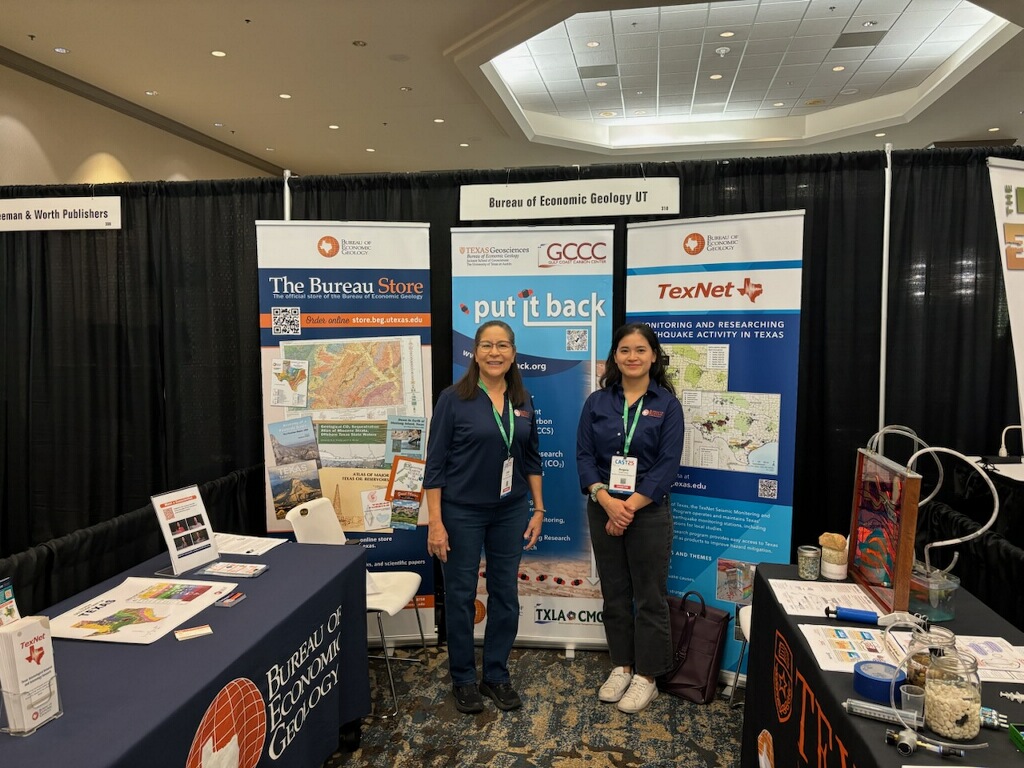
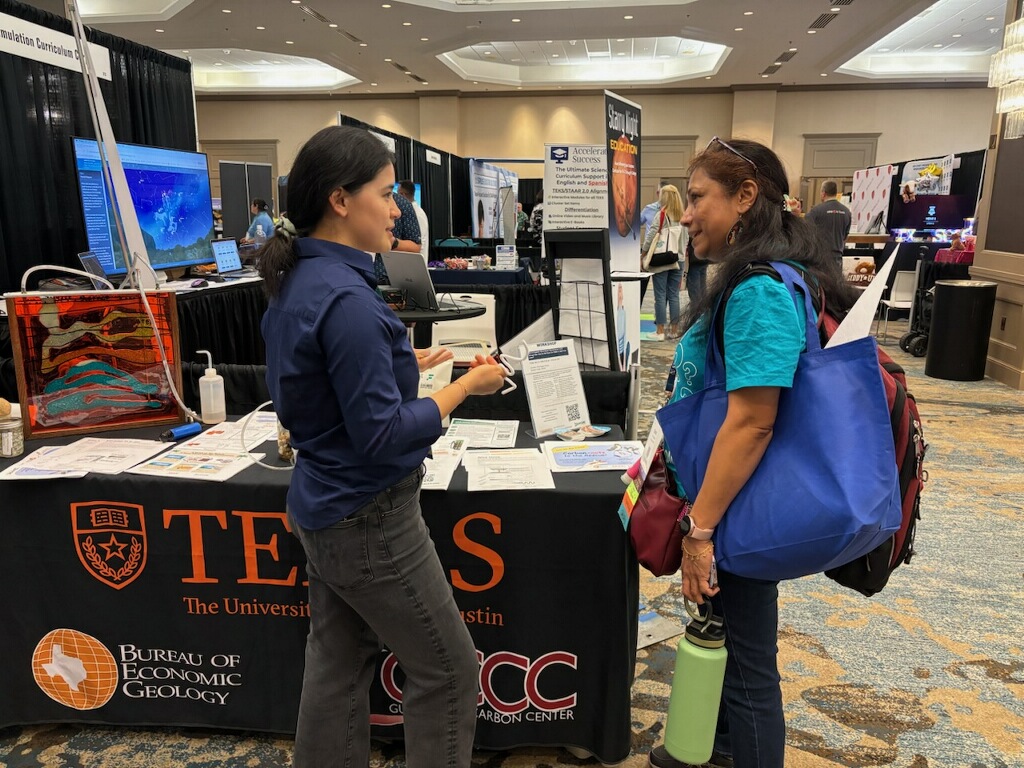
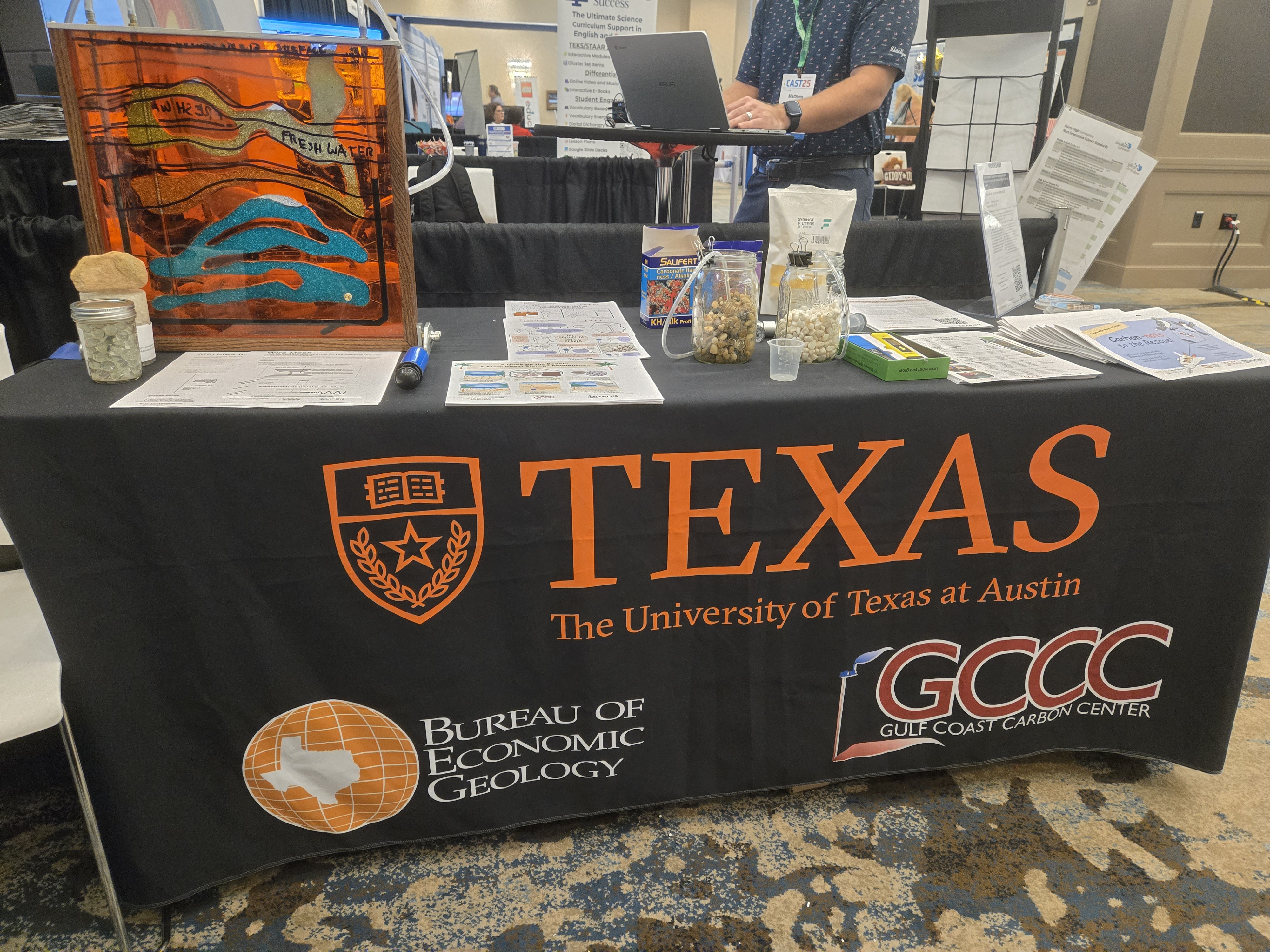

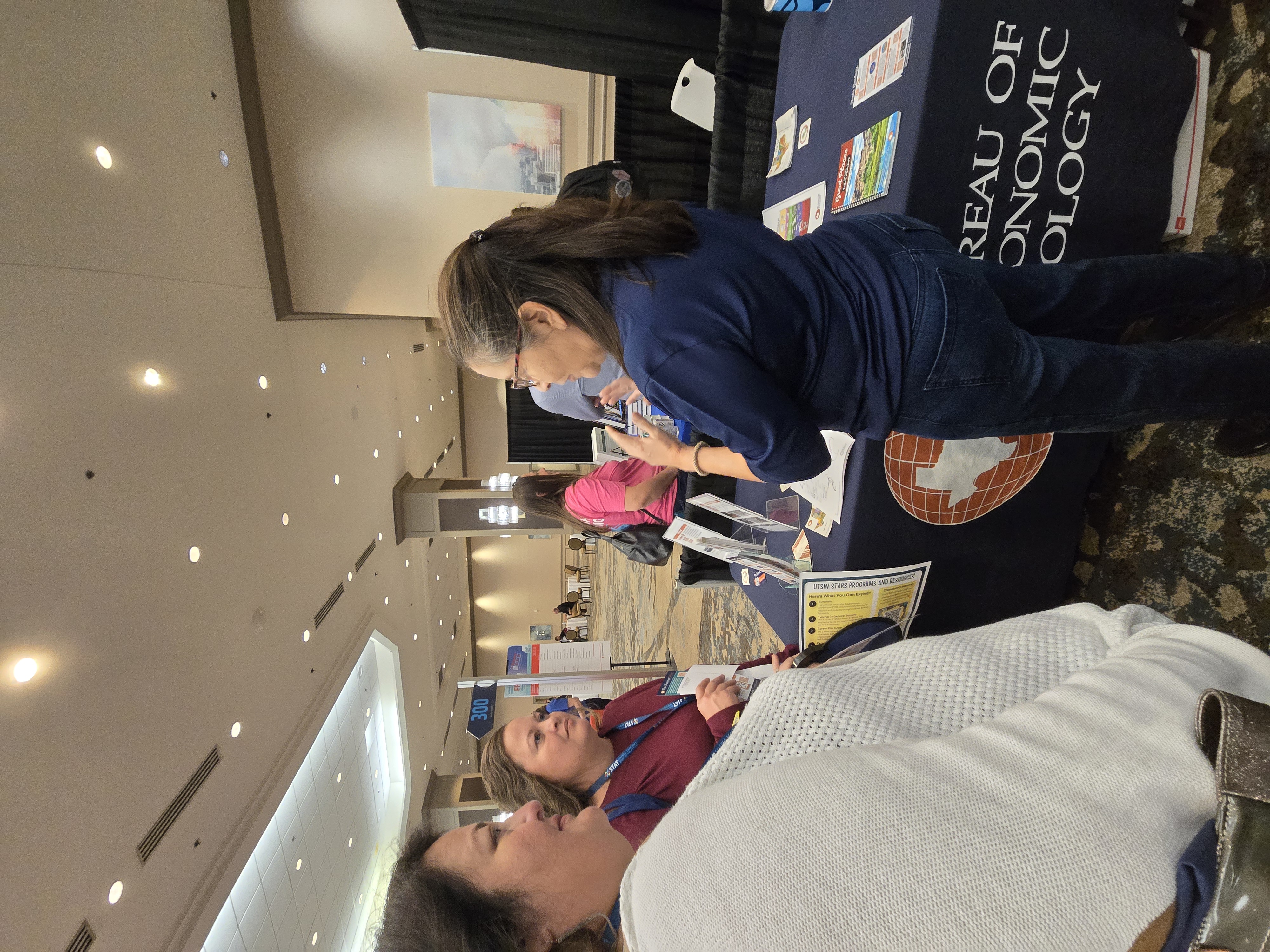
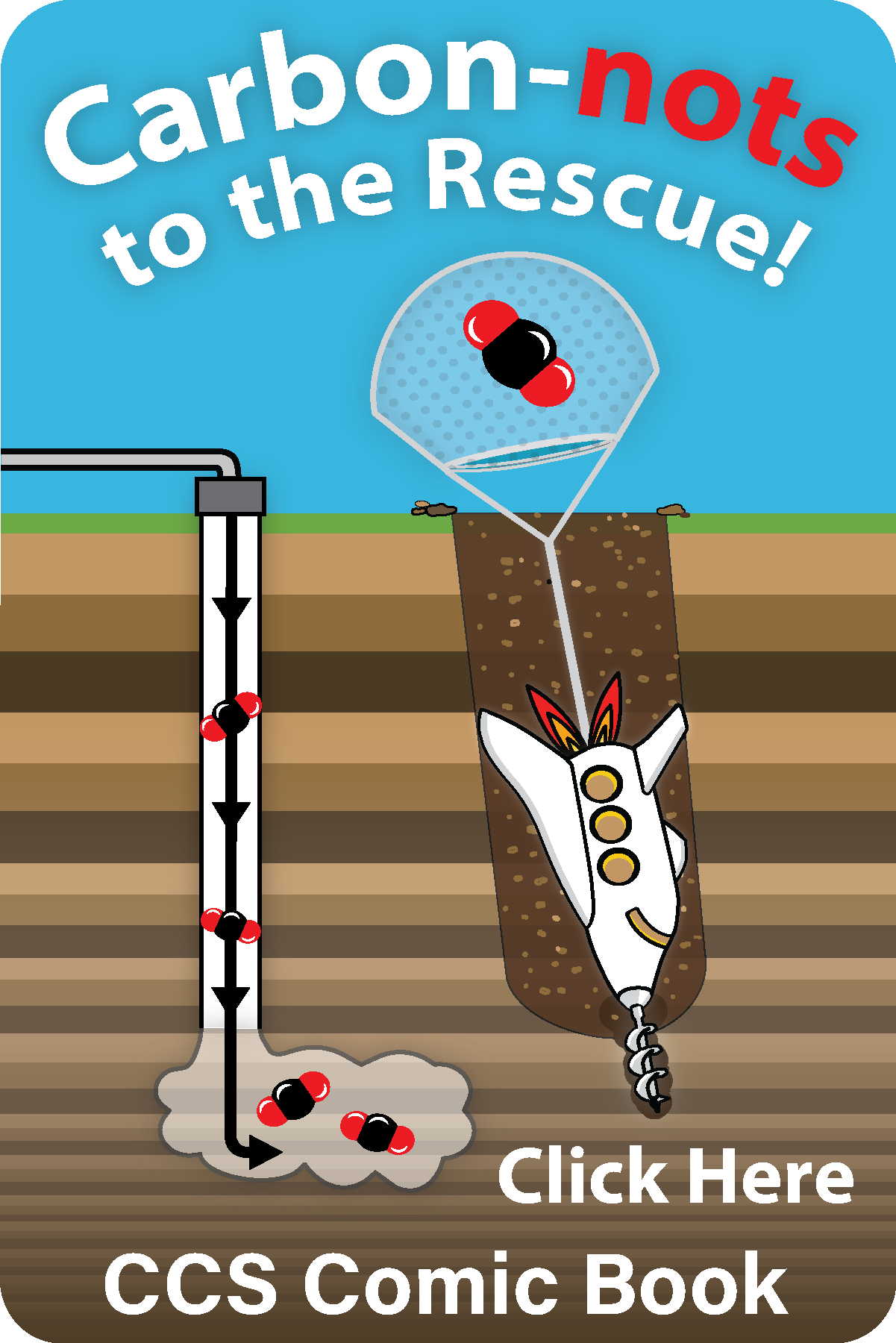
October 17–20, 2025: The GCCC’s Communications Coordinator, Dolores van der Kolk presented at the Geological Society of America’s National Convention & Exhibition, known as Connects 2025, in San Antonio, TX.
On Sunday, October 19, Dolores van der Kolk presented, "A Carbon Capture & Storage (CCS) Comic Book Created to Sustain Texas STEM and Public Acceptance: Carbon-nots to the Rescue!" Special thanks to illustrators & co-authors: Francine Mastrangelo, Sue Hovorka, Valerie Tran, and Angela Luciano.
Learn more about the GCCC’s CCS Comic Book that is available for FREE online or to purchase through the State Geological Survey of Texas here.
To reference or access this presentation: van der Kolk, D.A., Mastrangelo, F.M., Hovorka, S.D., Tran, V.H., and Luciano, A.K., 2025, A Carbon Capture & Storage (CCS) Comic Book Created to Sustain Texas STEM and Public Acceptance: Carbon-nots to the Rescue! [oral presentation]: GSA National Convention, San Antonio, TX, October 19, 2025 (Connects 2025).
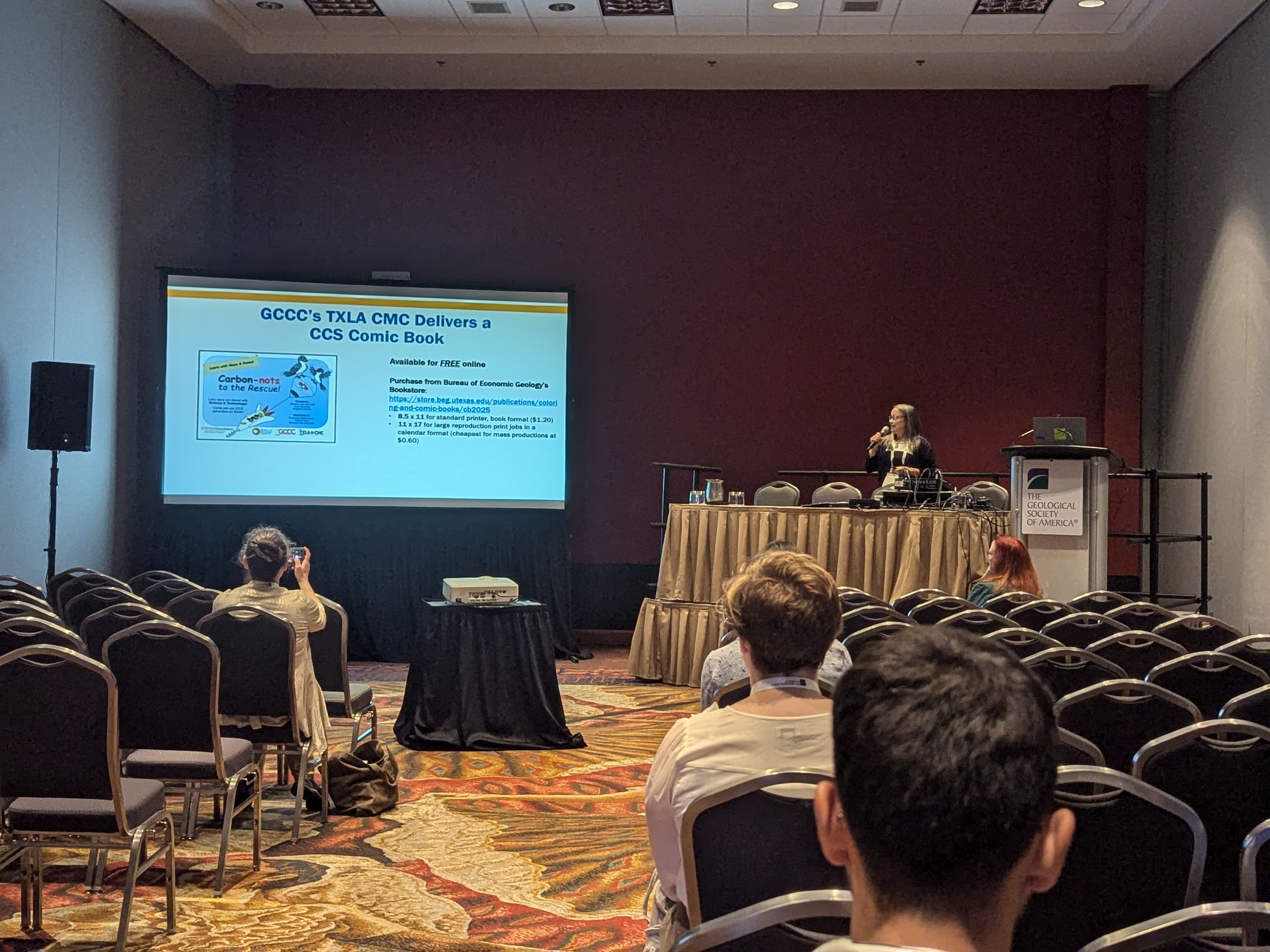
July 31, 2025: The GCCC was invited to the Bayou Bend Community Listening Session at the Sabine Pass Community Center. As a Texas-Louisiana Carbon Management Community (TXLA CMC) initiative, Angela Luciano presented hands-on activities about carbon storage with Dr. Tracy Benson and Saketh Madugula from Lamar University. The group provided information about carbon capture and storage (CCS) and answered questions from community members.
June 30–July 3, 2025: The GCCC’s Carbon-not Education and Ambassador program hosted two high school teachers, Christy Ross and Kristyn Stovall for a hands on 4-day workshop. The goal of this TXLA CMC workshop was to educate, provide training, and up-to-date resources about carbon capture and storage (CCS) for science teachers. CCS is a new STEM technology that is growing in Texas and is an excellent science topic to help advance STEM education. During this summer’s workshop, GCCC Researchers collaborated with experienced teachers to learn how CCS topics may be integrated into high school curricula and Texas Essential Knowledge and Skills (TEKS).
Christy, an Environmental Science teacher at La Vernia Independent School District (ISD), and Kristyn, a Chemistry teacher at Tatum ISD, focused on adapting a groundwater monitoring lab to fit their classes’ educational standards. These two teachers previously attended the GCCC’s CAST workshop in November 2024 held in San Antonio, and built on the previous work completed by our middle school teachers from the summer of 2024. The groundwater monitoring lab that they refined will include elements that will be integrated throughout the year to include conversations on environmental change, the energy transition, human activity, and more. Thank you, Christy and Kristyn, for allowing us to have such a successful workshop!
June 26, 2025: As part of TXLA CMC’s Carbon-not Education & Ambassador Program, the Gulf Coast Carbon Center helped support a one-hour webinar focused on bringing carbon capture and storage (CCS) into middle school science classrooms. Special thanks to Julia Dolive from Dulles Middle School with Fort Bend Independent School District (ISD) who taught the course in collaboration with Angela Luciano and Sue Hovorka from the GCCC.
The webinar covered how to present concepts from Texas Essential Knowledge and Skills (TEKS) including the greenhouse gas effect and carbon cycle, which included real-world CCS applications. Participants were provided with classroom ready materials aligned with Texas Educational Standards (aka TEKS) to help prepare and provide resources to teachers with recent TEKS updates. This webinar included teachers who work with 6th, 8th, or 6 through 8th grade levels from Benavides, Corpus Christi, Fort Bend, and Orange Grove ISDs.
November 14 – 16, 2024: Sue Hovorka, Angela Luciano, and Linda McCall attended the Science Teachers Association of Texas Conference for the Advancement of Science Teaching (CAST24) in San Antonio, TX. The group handed out over 300 recently released CCS comic books by the Gulf Coast Carbon Center (GCCC) that were specifically designed using Texas educational standards for 8th graders.
Access lesson plans and resources for the 7th and 8th grade below.
Back in July 2024, the GCCC hosted 3 middle school teachers for a STEM workshop about how to incorporate carbon capture and storage (CCS) concepts into STEM education while also providing teachers with the latest information about CCS developments in Texas. For the Carbon-not Ambassador Program, organized by the Texas-Louisiana Carbon Management Community, Dr. Cynthia L Hopkins from Corpus Christi Independent School District (ISD), Julia Dolive from Fort Bend ISD, and Stephanie Hurst from Cleveland ISD were selected. These Master Teachers worked with GCCC Researchers to create CCS curricula and resources suited for 7th and 8th graders based on Texas learning standards (Texas Essential Knowledge and Skills, known as TEKS). For more information, check out: www.put-it-back.org
- For the duration of the conference, the Bureau of Economic Geology, with support from GCCC Researchers, hosted a booth to distribute resources and awesome prizes to help boost STEM education.
- November 14 at 8 am – Dr. Cynthia L Hopkins and Stephanie Hurst hosted a workshop for science teachers about CCS-related, STEM lessons that are tied to the new TEKS learning standards that were created from our July workshop.
- November 16 at 9:30 am – The Bureau of Economic Geology participated in the TESTA Share-a-thon to spread awareness about lessons, demonstrations, and walk away with resources to learn more.

November 13, 2024: We are excited to release a new Carbon Capture and Storage (CCS) comic book entitled, “Carbon-nots to the Rescue!” geared towards Texas 8th graders that incorporates concepts from TEKS S.8.11.B. Click here to download and read more.
November 11, 2024: In exciting news, the Jackson School of Geosciences wrote an article about outreach facilitated by our new program, known as the Texas-Louisiana Carbon Management Community. Special thanks to our middle school teachers Cynthia Hopkins, Julia Dove, and Stephane Hurst for being our first Carbon-not Ambassadors! This JSG article was picked up by yahoo news and newsbreak.com.

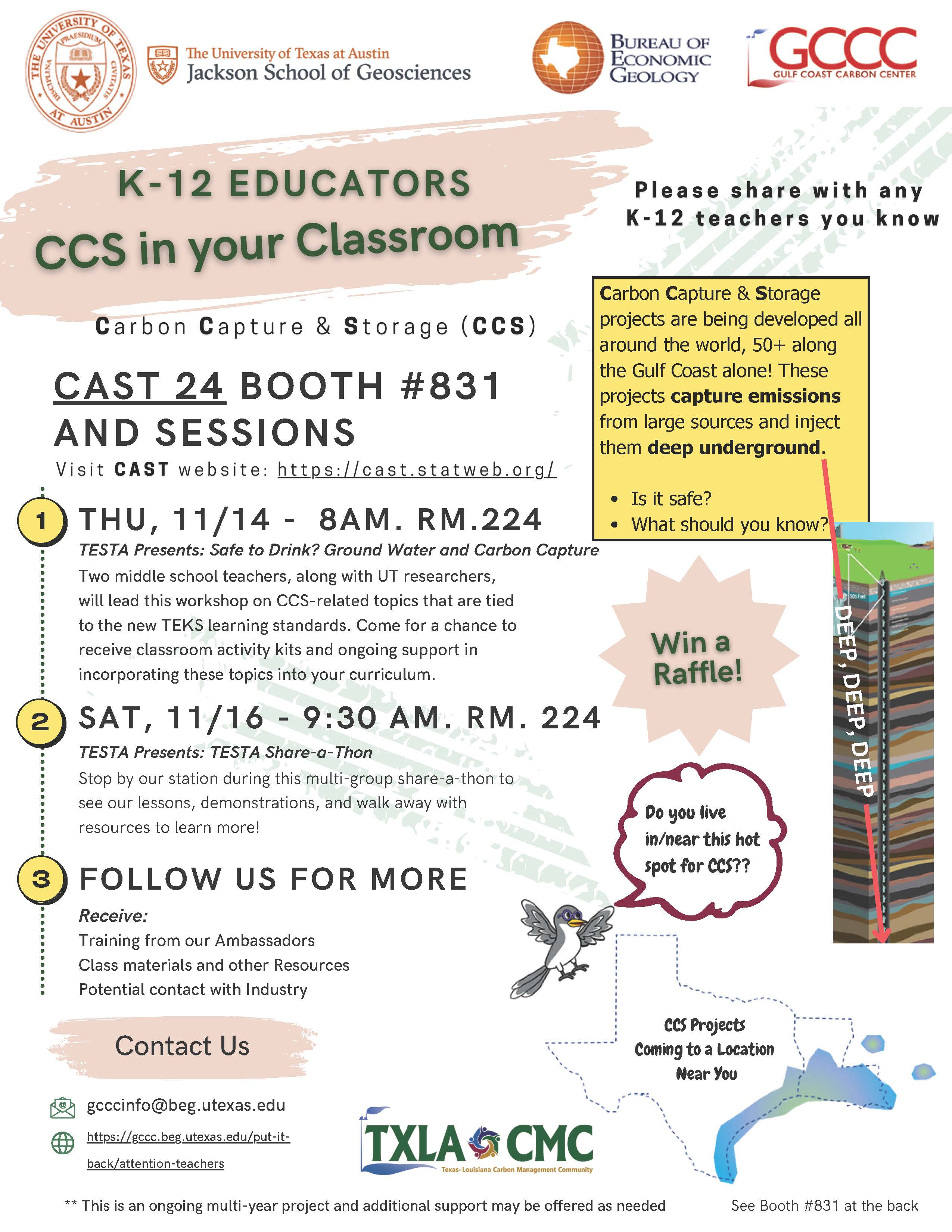
November 1, 2024: Come catch us at CAST24 on November 14-16, 2024! Linda McCall, Sue Hovorka, Angela Luciano, and Dolores van der Kolk from the State Geologic Survey of Texas, known as the Bureau of Economic Geology, will host a booth at the Conference for the Advancement of Science Teaching (CAST) held in San Antonio, TX.
As part of the Carbon-not Education & Ambassador program, middle school teachers Cynthia Hopkins and Stephanie Hurst, will showcase recently created and employed educational resources, curriculum, and materials to help explain carbon capture and storage (CCS) topics appropriate for K-12 students.
We look forward to meeting you, since we are currently seeking additional teachers willing to implement newly released curricula about current events and new technology into their classroom. To help future generations, we look forward to providing you with the appropriate training, materials, and support for your classroom success. Download the flyer about our activities here.
October 10, 2024: “ExxonMobil is leasing more than a quarter million acres of subsea land off the coasts of Galveston, Chambers, and Jefferson Counties to trap and store carbon dioxide permanently. Funds from the lease will benefit Texas’ Permanent School Fund.” The GCCC’s Researcher Tip Meckel was interviewed about this historic milestone, click here to read more.
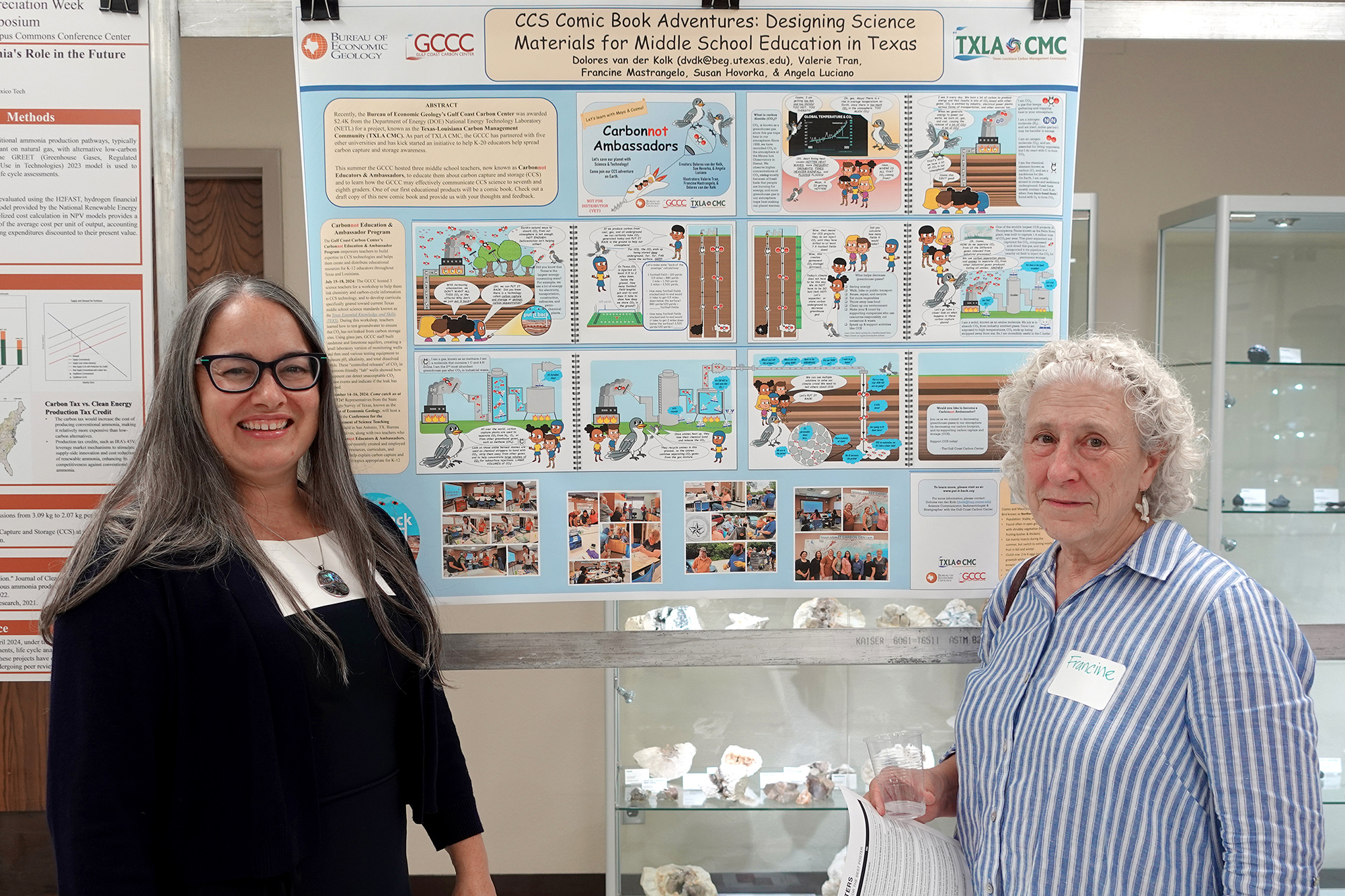
September 20, 2024: As part of our middle school teacher’s requests from our 2024 summer workshop, the Gulf Coast Carbon Center (GCCC) worked to produce a comic book about carbon capture and storage (CCS) with the idea of how greenhouse gases, can influence climate (see TEKS S.8.11.B) with subtle mentions of deforestation and urbanization.
The GCCC’s Communication Coordinator, Dolores van der Kolk, presented “CCS Comic Book Adventures: Designing Science Materials for Middle School Education in Texas” with her co-creators Valerie Tran, Francine Mastrangelo, Susan Hovorka, and Angela Luciano at the Texas State Geological Survey (Bureau of Economic Geology). The 10th Annual Bureau Research Symposium, included 23 posters total, and Dolores and her team tied with Hassan Dashtian for best poster at the Symposium. Read more about the symposium here.
July 15–18, 2024: The GCCC hosted three excellent science teachers for a workshop to help them link chemistry and carbon-cycle information to CCS technology, and to develop curricula specifically geared toward current Texas middle school science standards known as the Texas Essential Knowledge and Skills (TEKS). Julia Dolive (Fort Bend Independent School District, Fort Bend County), Cynthia Hopkins (Corpus Christi Independent School District, Nueces County), and Stephanie Hurst (Cleveland Independent School District, Liberty County) were selected for this prestigious program.
During this workshop, these teachers learned how to test groundwater to ensure that CO2 has not leaked from carbon storage sites. Using glass jars, the GCCC’s staff built sandstone and limestone aquifers, creating a small laboratory version of monitoring wells and then used various testing equipment to measure pH, alkalinity, and total dissolved solids. These “controlled releases” of CO2 in classroom-friendly “lab” wells showed how equipment can detect unacceptable CO2 release events and indicate if the leak has stopped.
Read more about the first Carbon-not Education & Ambassador Workshop and the day-to-day workshop activities that the teachers participated in here.
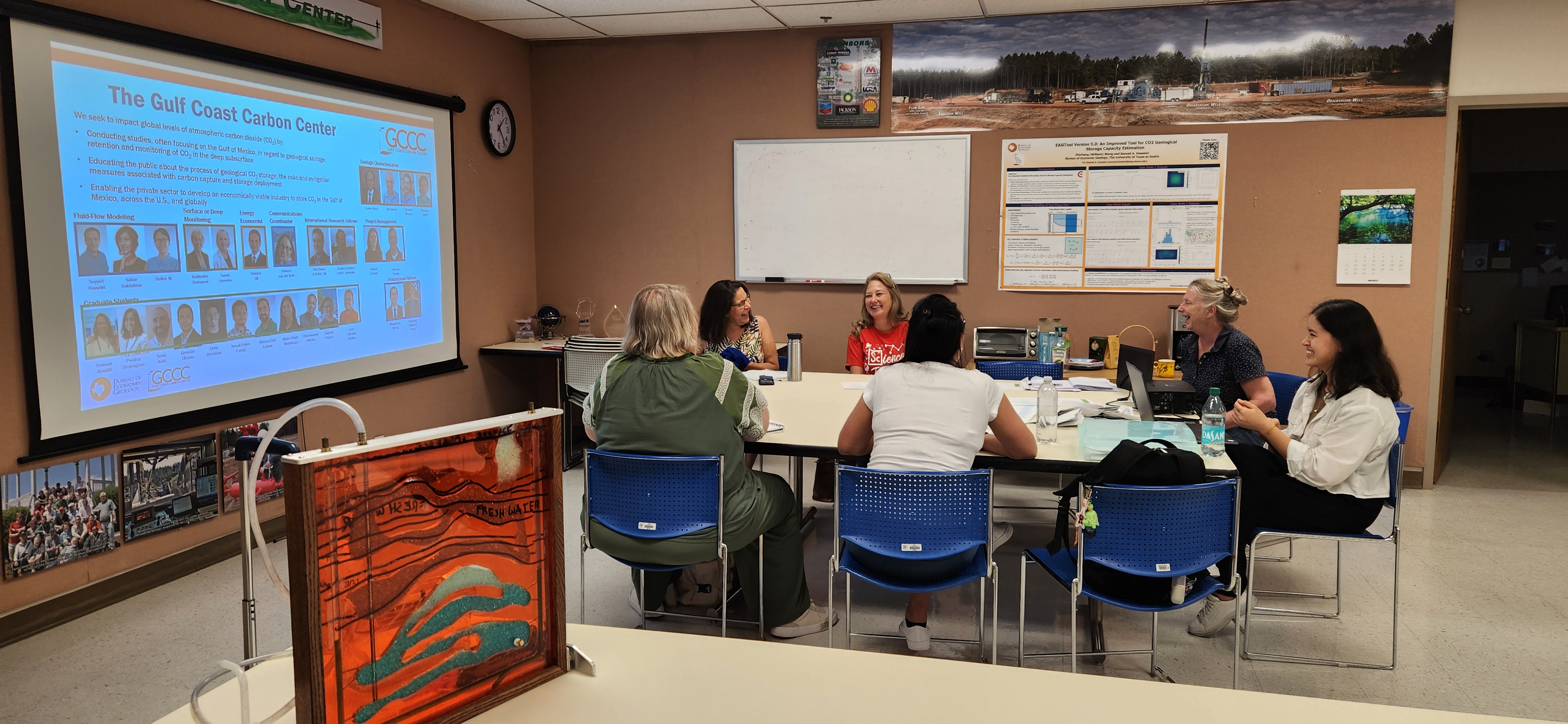
December 11th, 2023: Thanks to the Roads to Removal initiative by the Livermore Lab Foundation, which explores different options for carbon dioxide removal across the United States of America.
Check out great descriptions, and cool animations, about storing carbon dioxide in the ground. In this video, the Gulf Coast Carbon Center's (GCCC’s) Dr. Sue Hovorka explains how geological storage of carbon dioxide works, Kleinman Center for Energy Policy’s Research Professor Dr. Peter Psarras describes carbon transport and significance of biomass with narrations.
The Roads to Removal initiative includes a carbon removal report led by the Lawrence Livermore National Laboratory, co-authored by the GCCC's Sue Hovorka, Alex Bump, Ramón Arturo Gil-Egui, and Edna Rodriguez Calzado from the Bureau of Economic Geology at The University of Texas at Austin with dozens of other collaborators. For more information, check out: Roads2Removal.org
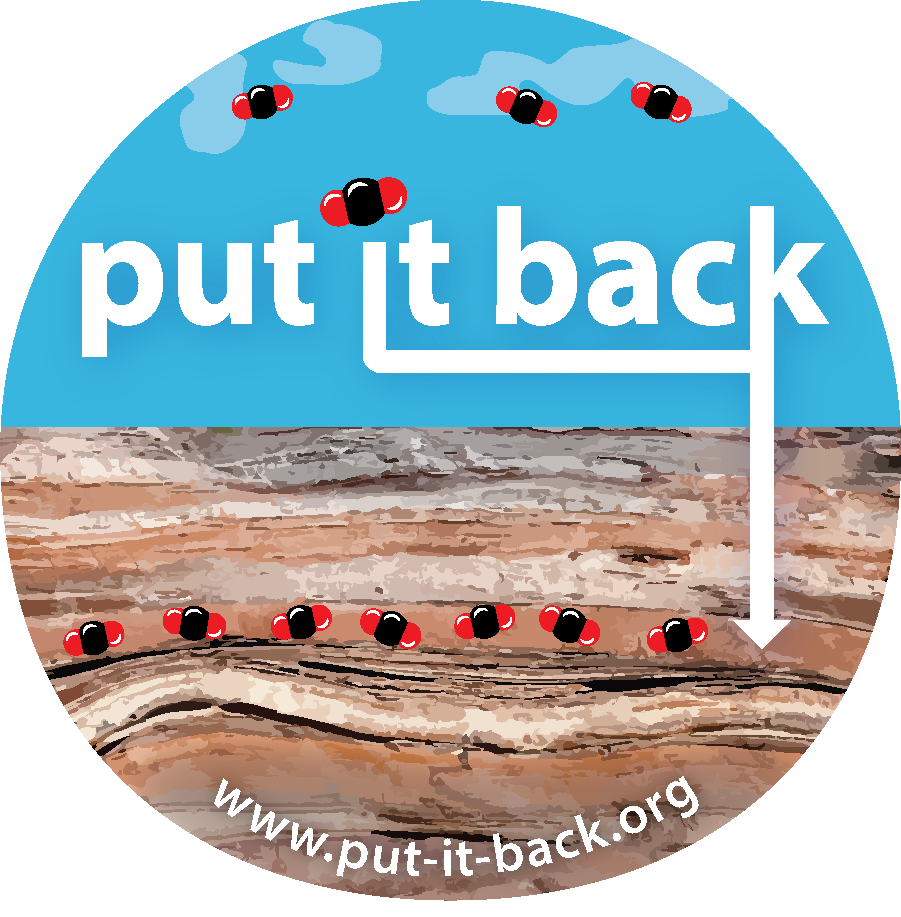
November 9-11, 2023: Linda McCall and Lucy Phlegar attended CAST23, presented by the Science Teachers Association of Texas, in Houston, Texas. Linda and Lucy engaged, recruited, and provided information to science teachers around Texas about the Bureau of Economic Geology (Bureau), the Gulf Coast Carbon Center (GCCC), as well as carbon capture and storage (CCS). The GCCC will start offering summer 2024 opportunities for Texas Educators to help design CCS educational experiences for students across Texas and Louisiana. They raffled off educational kits to provide teachers with hands-on demonstrations about carbon dioxide for students in their classroom.
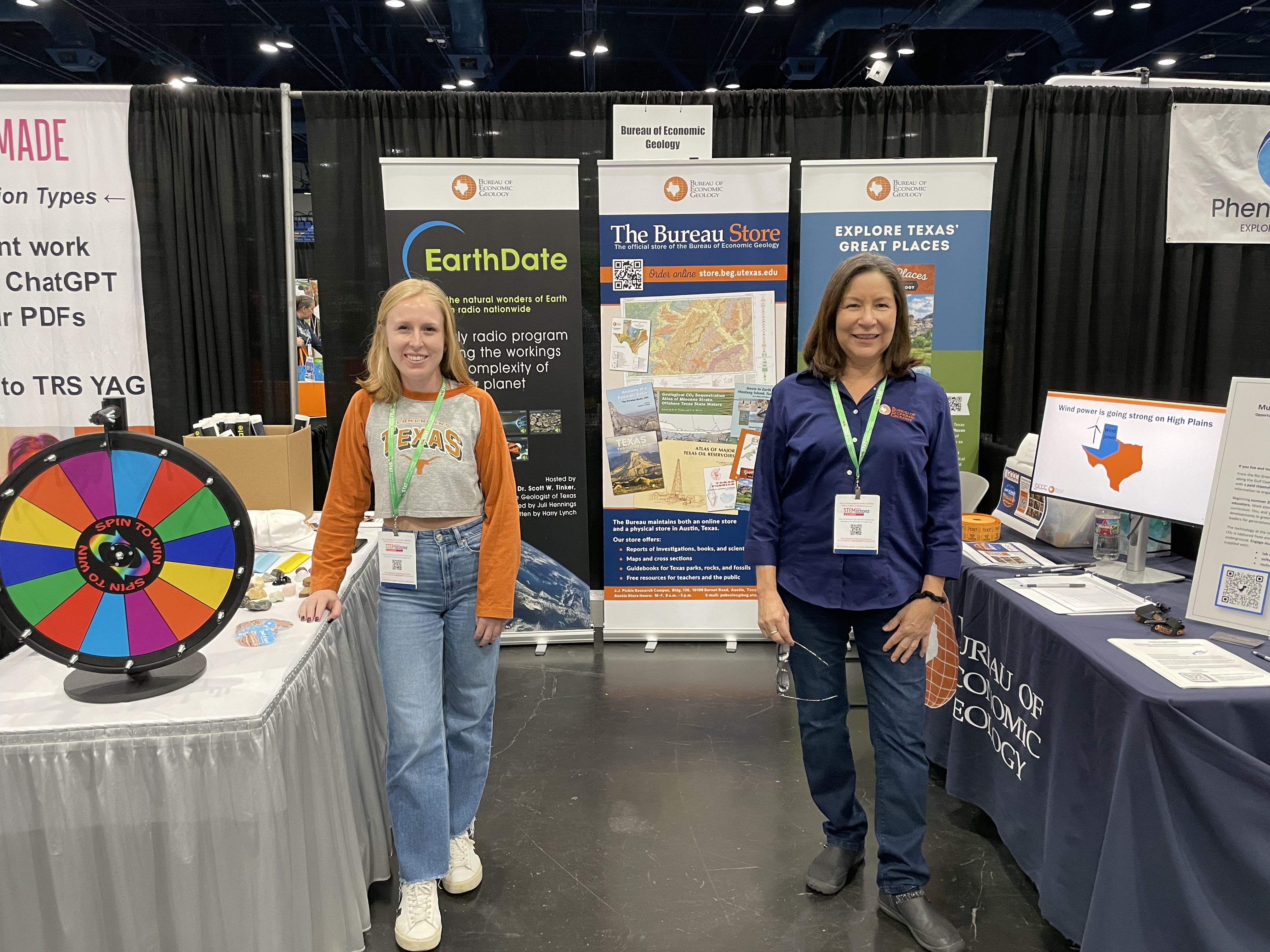
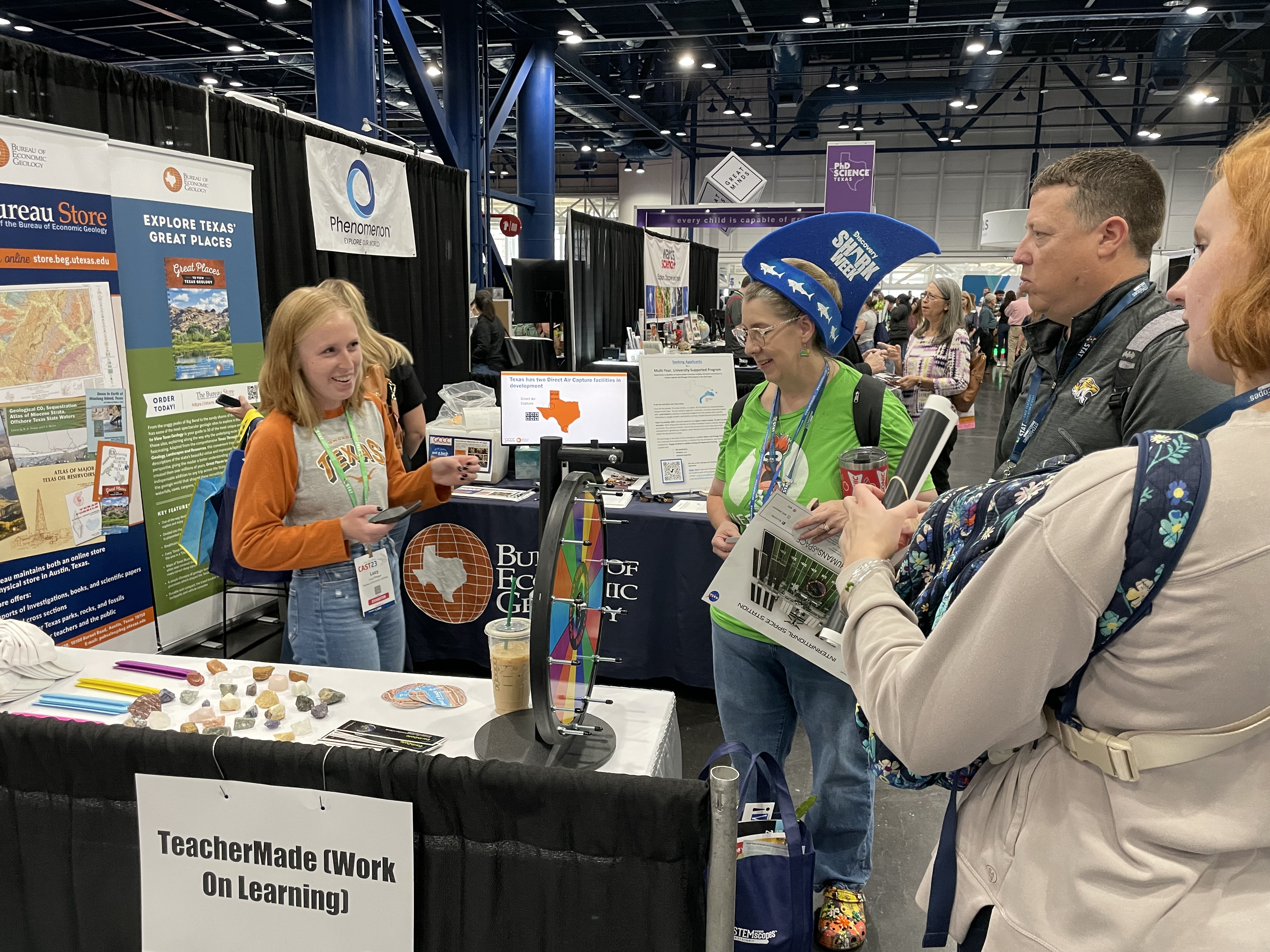
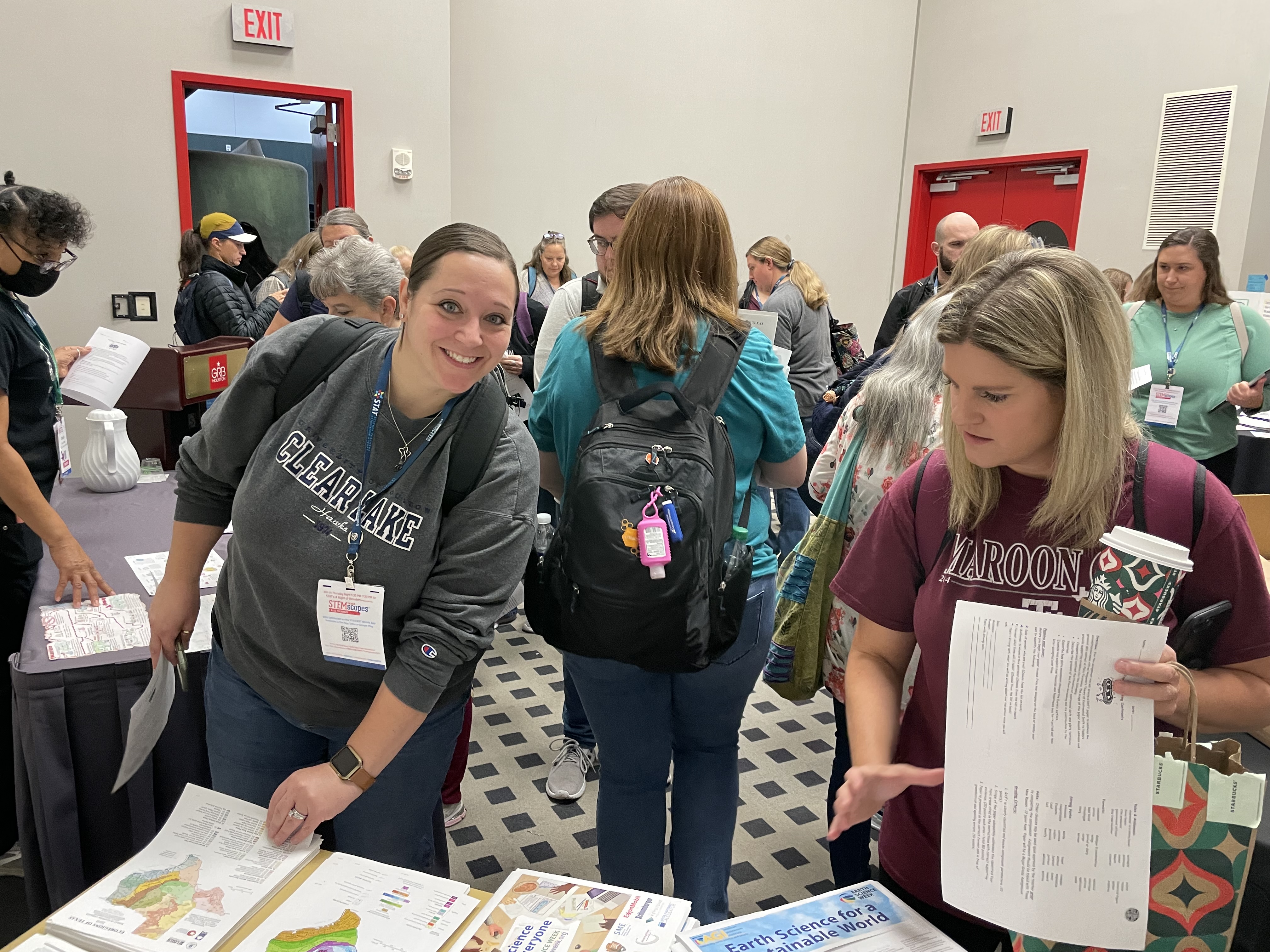
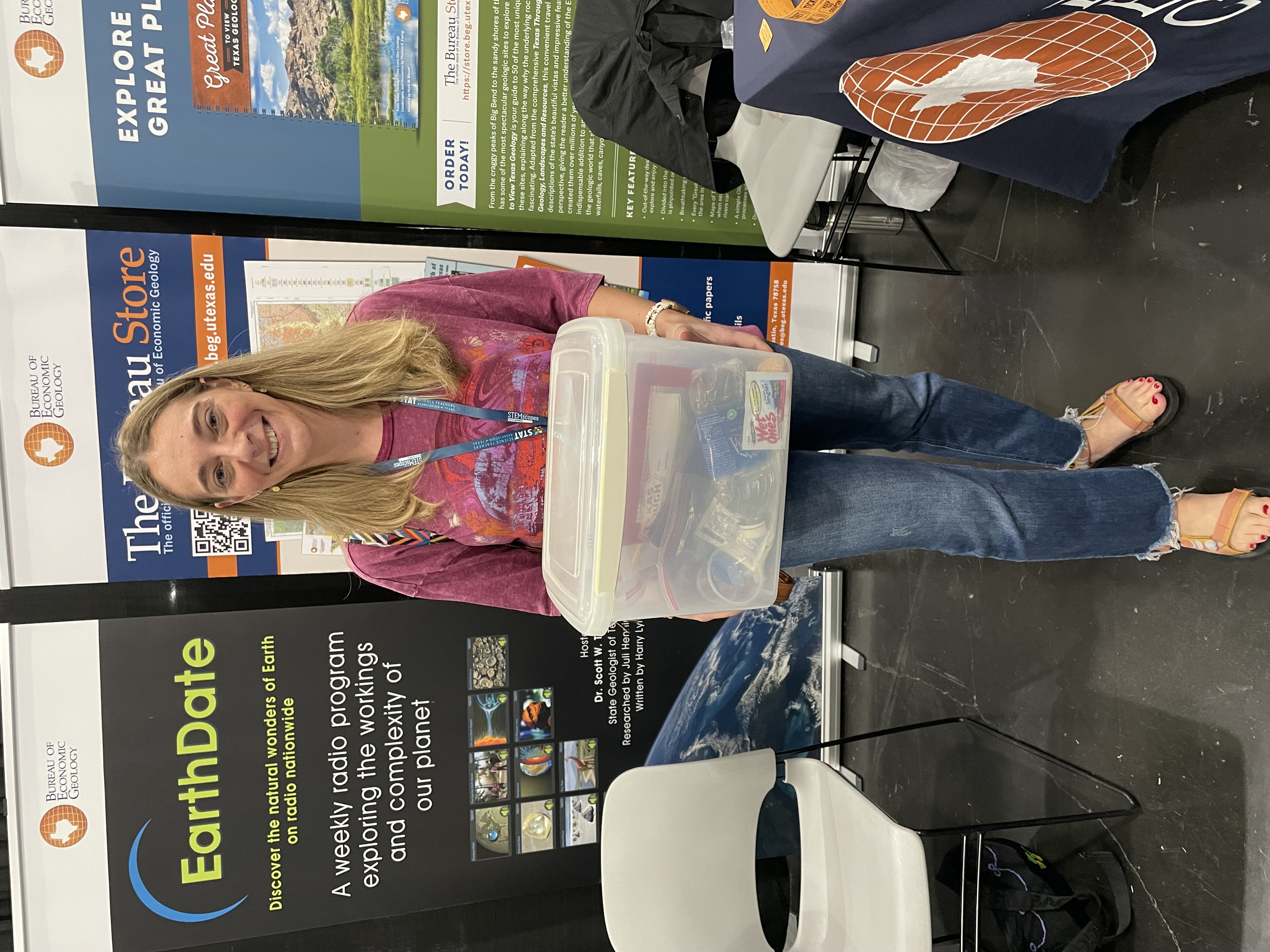

June 10, 2023: The Department of Energy (DOE) National Energy Technology Laboratory (NETL) recently selected the Gulf Coast Carbon Center’s (GCCC’s) “Texas-Louisiana Carbon Management Community (TXLA CMC)” proposal for negotiation. The proposal was in response to NETL’s Funding Opportunity Announcement, DE-FOA-0002799. TXLA CMC will provide stakeholders in the fossil-fuel heavy, industrial corridor hub of Texas and Louisiana with crucial information about carbon capture, utilization, and storage (CCUS) in order to help bridge environmental, public education-awareness knowledge gaps. We know that universities are well-trusted sources of information for the CCUS stakeholder community with strong existing missions, expertise, and facilities to host discussions and to provide information.
TXLA CMC proposes to achieve one of our many mission goals by having the GCCC partner with other universities and K-20 educators to help spread CCS/CCUS awareness. This DOE award supports a partnership with Lamar University in Beaumont, Texas; Texas A&M University campuses in Kingsville as well as Corpus Christi, Texas; University of Houston in Houston, TX; and Louisiana State University in Baton Rouge, LA. TXLA CMC will tap the expertise, networks and missions of these six universities in the region and will leverage the existing public, industrial, technical, and government outreach information and engagement strengths by each university’s expertise and having them both coordinate dialogue about all the critical components of CCUS to gain key perspectives and local knowledge from community agents.
By connecting and developing the stakeholder community, TXLA CMC will accelerate situationally appropriate deployment of CCUS as an emissions mitigation option for dozens of large volume industrial and power sector CO2 emissions sources in the region. This community will also support expanding the already advanced hydrogen production system while enhancing the development of Direct Air Capture (DAC) projects.
TXLA CMC will enhance access to information by: 1) listening to the public as individuals, community representatives, and interest groups, project developers, landowners, regulators, consultancies entering CCUS service, and policy makers. 2) tracking project development to facilitate data collection, sharing and analysis in a timely manner; 3) uniting diverse expertise across the community to optimize development; 4) bringing expertise to the community from colleagues across the US and globally for regional technology transfer; 5) making information available via diverse mechanisms including in-person meetings, information and discussion sessions, one-on-one conversations with key stakeholders, training, education at various levels, as well as internet, film, and traditional publication information dispersal methods with awareness of energy, equity, and environmental justice (EEEJ) needs. A critical mission is to help coordinate, create, and distribute educational resources for Texas and Louisiana.
Last updated: December 15, 2025

